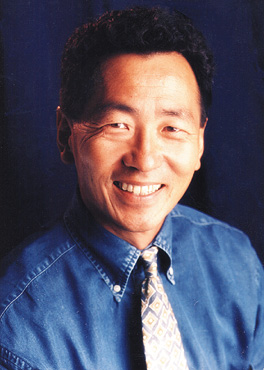|
ASIAN AMERICAN BUSINESS |
CONTACT US
|
ADVERTISING INFO
© 1996-2013 Asian Media Group Inc
No part of the contents of this site may be reproduced without prior written permission.
MICROSOFT'S ASIAN PIONEER
PAGE 2 of 10
GS: Was it the stereotypical Asian American thing or was your dad an engineer?
Oki: No. He actually didn't finish college--internment got in the way of that.
GS: What kind of kid were you?
Oki: I listened to my parents, mostly my dad. You did what he said
or you had hell to pay.

GS: Did you fear him?
Oki: He was definitely a disciplinarian.
GS: What about your mom?
Oki: Just the opposite. She was probably the stereotypical Japanese American wife.
GS: Were you closer to your mom?
Oki: I think I was pretty close to both. It's just that my father probably had more of a say in how we were reared.
GS: Did you work to help support the family?
Oki: We were lower-middle-income. It wasn't so much to support the family as it was to reinforce some fairly strong work ethics, everything from picking strawberries and blackberries in the summer to tieing tackle during winter.
GS: How did you end up at the University of Colorado?
Oki: It was during the Vietnam conflict. Rather than get drafted into the army I decided to enlist into the Air Force. I had a sweet deal, a guaranteed tour of duty at the Air Force Academy in the band.
GS: What did you play?
Oki: I was actually a saxophone player but I was a percussionist in the band. They didn't have any saxophone openings when I auditioned.
GS: What did you do for two years before the air force?
Oki: For the first 18 months I was at the University of Washington.
GS: So you basically screwed around and went into the Air Force to save yourself?
Oki: Yeah... You kind of know you're not on the right path and you'd better do something. It just so happened that I had received a low lottery number, so I knew I was a very likely candidate to get my draft notice. I actually received a draft notice and I said, Well, I really don't want to go over to Nam as a footsoldier. I basically figured out another way to satisfy the military commitment.
GS: Was it for two years?
Oki: Air Force was four years, but it was a guaranteed tour. You spend a little more time but you don't get shot at.
GS: When did you start at the University of Colorado?
Oki: I was going part-time while serving in the military, so by the time I had served my four years, I was about six credits shy of a bachelor's degree. I was spending most of my time actually going to school. Being in the band wasn't very demanding. I spent two hours a day practicing and the rest of the time was yours.
[CONTINUED BELOW]
GS: How did you come by a magna cum laude?
Oki: Once I got to Colorado I kind of applied myself. I had always done well academically until I had started fooling around at the University of Washington and didn't attend class. It has a way of catching up with you. Reapplying myself and getting a bit more mature about my outlook on life and what I should be spending my time focusing on. Academics were always fairly easy for me.
GS: Did you decide you wanted to be an accountant?
Oki: I didn't know what I really wanted to do but everyone told me that having an accounting background was good from a business standpoint. Then I had a professor who talked me into pursuing a computer major also, which I did.
GS: Then you went on to get an MBA in only one year?
Oki: Yeah. I had notions probably early on of doing a CPA and getting out with one of the public accounting firms. Not knowing anything better, I decided to concentrate my elective credits of the MBA on the accounting. Then my professor got me interested in computers said, Here's a job. So he found me my first job. I really didn't have to interview.
GS: At Looart Press. What did you do there?
Oki: I was writing code. Data base applications.
GS: How did you like that?
Oki: I hated it. I didn't think I was particularly good at writing code. I certainly wasn't real passionate about it.
GS: Not a Bill Gates?
Oki: No, not at all. I pursued greener pastures and the Hewlett Packard thing opened up. PAGE 3
| "I didn't think I was particularly good at writing code. I certainly wasn't real passionate about it." |
